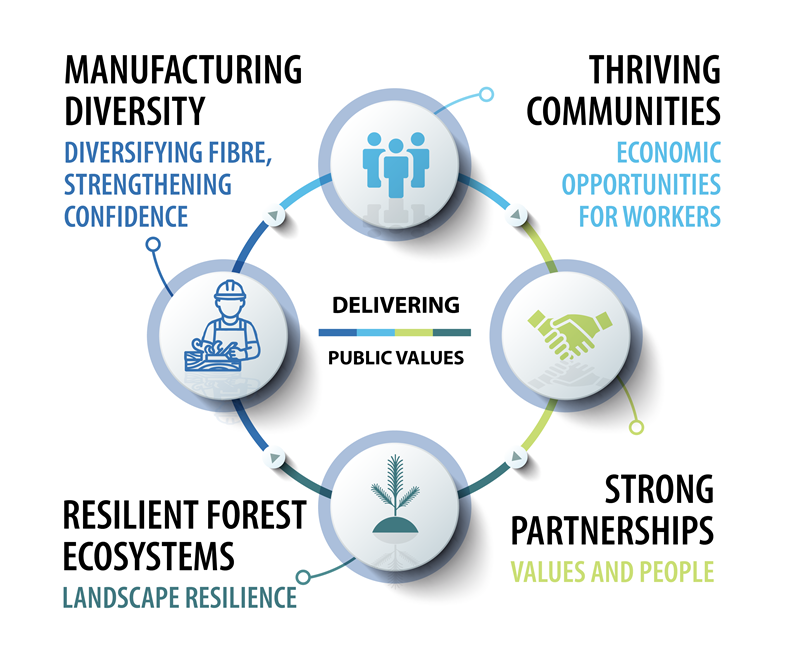BC Timber Sales Review: taking action to evolve BCTS
 Forests Minister Ravi Parmar announced the Province is expanding the role of BC Timber Sales (BCTS), to ensure B.C.’s forests continue to provide ecological, cultural, social and economic benefits for future generations.
Forests Minister Ravi Parmar announced the Province is expanding the role of BC Timber Sales (BCTS), to ensure B.C.’s forests continue to provide ecological, cultural, social and economic benefits for future generations.
On this page
The BC Timber Sales Review
In January 2025, the Province launched a review of BC Timber Sales (BCTS) to ensure British Columbia’s forestry sector continually evolves to overcome challenges and create a stronger, more resilient future.
The launch of the review recognized the significant pressure the forest sector is under. This pressure stems from a declining allowable annual cut, difficulty accessing fibre, global economic conditions and heightened environmental and trade-protection efforts. Building on the ongoing work of BCTS, as well as past forestry-sector engagement, the review has provided recommendations about the role of BCTS in moving the sector forward.
The Task Force and engagement
The BCTS review was guided by an expert task force consisting of George Abbott, former MLA, Brian Frenkel, Vanderhoof city councillor, and Lennard Joe, chief executive officer, First Nations Forestry Council.
The task force members met with 50 groups and individuals, held two virtual engagement sessions, and received over 300 submissions from January to July 2025. Its recommendations are reflective of the extensive feedback it received from those who care for our forests and are deeply invested in sustainable management, cultural significance, and long-term health.
What's next
Based on the engagement between January and July 2025, the task force members have put together the BCTS Task Force Recommendation Report (PDF,11MB).
In addition to the original BCTS mandate to auction publicly owned timber and set price benchmarks, the Province is expanding the BCTS mandate to ensure the Province can effectively respond to the specific, unique needs of each community and wood product manufacturer. This will ensure BCTS can better serve forestry entrepreneurs and local mills who are investing in existing or new local, independent or value-added forestry operations.
The expanded mandate of BCTS is centred around four key cornerstones:
- Build thriving communities, with good jobs for people
- Supporting manufacturing diversity
- Strong partnerships with First Nations and communities
- Resilient forest ecosystems
Work is underway on a strategic approach for implementing the task force recommendations. This builds upon the foundation of the work that BCTS has continuously undertaken to serve the public interest, ensuring that forest management reflects the values of British Columbians.
This direction will be established to ensure that BCTS continues to manage the landbase in a way that is transparent, inclusive, and responsive to the diverse needs of communities, First Nations, and forestry interest holders. Through this work, BCTS will strengthen its role, supporting long-term resiliency, prosperity, and public trust.
Actions Underway
The Province has reviewed the task force recommendations and begun implementing several initiatives that support a sustainable and resilient forest sector. These actions include:
- Utilizing the expertise in BCTS to manage stewardship projects, wildfire risk reduction, dangerous trees removal, rehabilitation of range land, and partial harvest to maintain forest health
- Doubling the dedicated fibre supply for value-added wood manufacturing companies to 20% of BCTS forestry licences
- Making it easier for smaller companies to bid on auctions in groups
- Auctioning commercial thinning timber sales that improve forest health by reducing the understory, allowing trees more space to grow and strengthen against fire and pests
- Active long term forest planning through planting a variety of climate adapted species and other native tree species
- Increasing the role of fire in planning for reforestation and wildfire risk reduction.
- First Nations partnerships which support obtaining fair-market returns for timber under licences
- Taking action to improve the use of logging residuals like branches and tree tops to support sectors like the pulp sector

